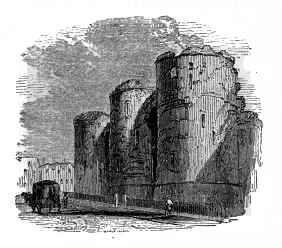English Barons in Ireland

King John's Castle, Limerick
Quarrels of the English Barons—The Interdict—John crushes and starves an Archdeaconto Death—King John's Visit to Ireland—He starves the Wife and Son of Earl de Braose to Death—Henry de Londres—The Poet O'Daly—Obituaries of Good Men—Henry III.—Regulations about the Viceroy—The Scorch Villain—Scandalous Conduct of the Viceroys—Three Claimants for Connaught—Death of Hugh Crovderg—Felim O'Connor—Henry's Foreign Advisers—Plots against the Earl of Pembroke—He is wounded treacherously—His Pious Death—Misfortunes of the Early Settlers—De Marisco's Son is hanged for High Treason, and he dies miserably in Exile.
[A.D. 1201—1244.]

ING JOHN was now obliged to interfere between his English barons in Ireland, who appear to have been quite as much occupied with feuds among themselves as the native princes. In 1201 Philip of Worcester and William de Braose laid waste the greater part of Munster in their quarrels. John had sold the lands of the former and of Theobald Walter to the latter, for four thousand marks—Walter redeemed his property for five hundred marks; Philip obtained his at the point of the sword. De Braose had large property both in Normandy and in England. He had his chancellor, chancery, and seal, recognizances of all pleas, not even excepting those of the crown, with judgment of life and limb. His sons and daughters had married into powerful families. His wife, Matilda, was notable in domestic affairs, and a vigorous oppressor of the Welsh. A bloody war was waged about the same time between De Lacy, De Marisco, and the Lord Justice. Cathal Crovderg and O'Brien aided the latter in besieging Limerick, while some of the English fortified themselves in their castles and plundered indiscrimately.
